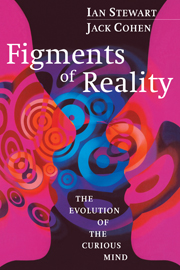Book contents
- Frontmatter
- Contents
- Preface
- Figure Acknowledgements
- Prologue
- 1 The Origins of Life
- 2 The Reductionist Nightmare
- 3 Ant Country
- 4 Winning Ways
- 5 Universals and Parochials
- 6 Neural Nests
- 7 Features Great and Small
- 8 What is it Like to be a Human?
- 9 We Wanted to Have a Chapter on Free Will, but We Decided not to, so Here It Is
- 10 Extelligence
- 11 Simplex, Complex, Multiplex
- Epilogue
- Notes
- Further Reading
- Index
2 - The Reductionist Nightmare
Published online by Cambridge University Press: 11 August 2009
- Frontmatter
- Contents
- Preface
- Figure Acknowledgements
- Prologue
- 1 The Origins of Life
- 2 The Reductionist Nightmare
- 3 Ant Country
- 4 Winning Ways
- 5 Universals and Parochials
- 6 Neural Nests
- 7 Features Great and Small
- 8 What is it Like to be a Human?
- 9 We Wanted to Have a Chapter on Free Will, but We Decided not to, so Here It Is
- 10 Extelligence
- 11 Simplex, Complex, Multiplex
- Epilogue
- Notes
- Further Reading
- Index
Summary
According to the opening paragraph of Stephen Hawking's A Brief History of Time, a famous scientist – possibly Bertrand Russell – was giving a public lecture on astronomy. He described the structure of the solar system and its place in the galaxy. At the end of the talk, a little old lady at the back stood up and complained that the lecture was utter rubbish. The world, she pointed out, was a flat disc riding on the back of four elephants, which in turn rode on the back of a turtle.
‘But what supports the turtle?’ the scientist objected, with a superior smile.
‘You're very clever young man,’ said the woman, ‘but you can't fool me. It's turtles all the way down!’
(Actually Hawking tells the story with ‘tortoise’ where we have put ‘turtle’, and unaccountably omits the elephants. We have rewritten the story slightly in order to pay proper deference to Great A'Tuin – whom, of course, you recognise as the turtle who supports Discworld in the fantasy series by Terry Pratchett.)
To many people, science is seen as a source of certainty, a box full of answers that can be trotted out when dealing with life's many questions. Most working scientists, however, see their subject in a very different light: as a method for navigating effectively in an uncertain world. Whatever science may be, it is not just a matter of assembling ‘the facts’.
- Type
- Chapter
- Information
- Figments of RealityThe Evolution of the Curious Mind, pp. 33 - 62Publisher: Cambridge University PressPrint publication year: 1997



